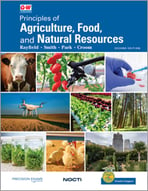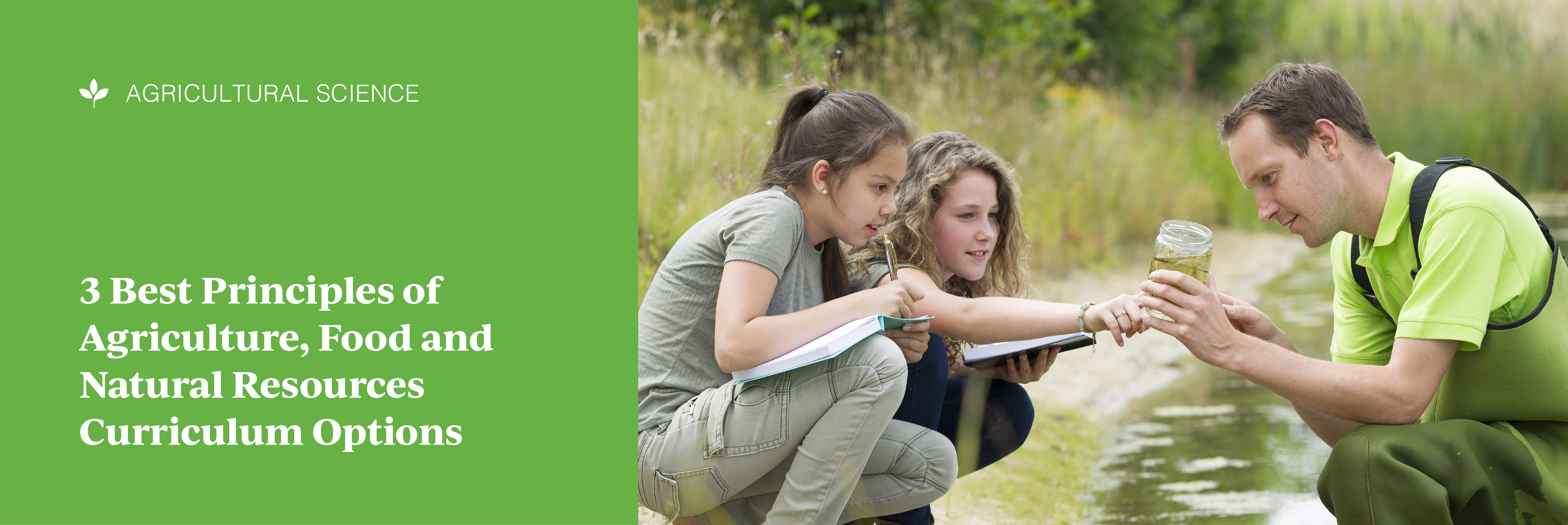3 Best Principles of Agriculture, Food and Natural Resources Curriculum Options
After serving as a Texas FFA state officer in 2018, Josh Witherspoon joined the iCEV team as a part-time employee for 3 years before taking on the role of content development specialist in 2022. Witherspoon holds a bachelor's degree in agricultural communications from Texas Tech University, in which his experience and proficiency in writing, marketing and CTE allow him to effectively communicate the successes of CTE educators and students and the value iCEV has to offer.
The agriculture industry is constantly changing and evolving, offering unmatched opportunities for today’s students.
If you teach in a high school agricultural science program, you’re probably looking for a Principles of Agriculture curriculum to provide students with the foundational knowledge and skills to explore other areas of the industry and advanced courses in your program.
But what Principles of Agriculture resources are out there? How are they structured and what do they cost? As a dedicated provider of agriculture science curriculum and resources, iCEV did the heavy lifting for you!
In this article, you’ll discover 3 of the best high school principles of agriculture curriculum options:
- eDynamic Learning: Principles of Agriculture, Food and Natural Resources
- Principles of Agriculture, Food, and Natural Resources, 2nd Edition Textbook
- CASE: Introduction to Agriculture, Food and Natural Resources (AFNR)
After reading this article, you’ll have a better understanding of what each curriculum offers so you can decide which works best for your classroom.
1. eDynamic Learning’s Principles of Agriculture, Food and Natural Resources Curriculum
 eDynamic Learning (eDL) is an online career and elective course curriculum provider that produce hundreds of resources within numerous CTE pathways. Their Principles of Agriculture, Food and Natural Resources course offers students an introduction to the diverse areas of agriculture as well as the foundational knowledge and skills necessary to succeed.
eDynamic Learning (eDL) is an online career and elective course curriculum provider that produce hundreds of resources within numerous CTE pathways. Their Principles of Agriculture, Food and Natural Resources course offers students an introduction to the diverse areas of agriculture as well as the foundational knowledge and skills necessary to succeed.
eDL’s Principles of Agriculture, Food and Natural Resources curriculum consists of 10 units:
- Careers in Agriculture, Food, & Natural Resources
- Leadership, Ethics, & Work Habits
- Agriculture, Food, & Natural Resources in Context
- Recordkeeping & Information Technology
- Plant Structures & Systems
- Understanding Animal Science
- Food Processing & Production
- Power, Structural, & Technical Systems
- Natural Resources Today
- Agriculture & the Environment.
How much does eDynamic Learning’s Principles of Agriculture, Food and Natural Resources curriculum cost?
eDL doesn’t provide pricing information for their courses on their website. You’ll have to reach out to them directly if you want specifics on how much their products will cost. eDL doesn’t sell directly to teachers and instead sells to districts. This means to access eDL course materials, teachers will need to start the implementation process with their administrators.
Who is eDynamic Learning’s Principles of Agriculture, Food and Natural Resources curriculum intended for?
As a digitally based curriculum option, eDL’s Principles of Agriculture, Food and Natural Resources course would fit well for a teacher looking for quality and consistent resources for a blended or virtual environment.
eDL also offers companion courses for teachers looking to further expand their student’s foundational knowledge and skills, including Agriscience 1: Introduction and Introduction to Forestry: And Natural Resources.
Due to the digital nature of this course, the hands-on activities for students are simple in design and lack the in-depth exploration and application of hands-on skills found within traditional in-person classrooms. This option works well for teachers who want to rely on a primarily digital learning experience for their students and don’t want or need the benefits of a comprehensive curriculum system.
2. Principles of Agriculture, Food, and Natural Resources Textbook, 2nd Edition
 Authors: John S. Rayfield, Kasee L Smith, Travis D. Park and Barry Croom
Authors: John S. Rayfield, Kasee L Smith, Travis D. Park and Barry Croom
Copyright: G-W Publishers, 2023
Principles of Agriculture, Food, and Natural Resources, 2nd Edition is a comprehensive, AFNR standards-aligned introduction to the systems and concepts that define modern agriculture, including food systems and natural resources.
This textbook is split into 17 sections:
- Agriculture and Society
- Leadership in Agriculture
- Agriculture as a Career
- Agricultural Safety
- Agriculture Science
- Agricultural Technology
- Agricultural Power and Engineering
- Agricultural Mathematics
- Importance of Food
- Large Livestock Production
- Small Livestock Production
- Other Animal Production
- Plant Production
- Environmental Systems Impacting Agriculture
- Soil and Water Conservation
- Natural Resources and Recreation
- Forestry
This textbook can also be accompanied by a Student Lab Workbook that includes hands-on applications for each lesson. With access to the lab workbook, teachers gain access to the Online Learning Suite which houses the AFNR video library of over 30 videos, scripted and produced by agriculture experts on topics of high interest to students.
How much does the Principles of Agriculture, Food, and Natural Resources Textbook, 2nd Edition cost?
Principles of Agriculture, Food, and Natural Resources, 2nd Edition costs $158.64 for the hardcover text alone. In addition, the text can be accompanied by a Student Lab Workbook for $40.00 or bundle the hardcover text and lab workbook for $188.64.
Who is Principles of Agriculture, Food, and Natural Resources, 2nd Edition intended for?
This textbook is a good fit for high school teachers looking for a reliable year-long curriculum to teach students the fundamentals of agriculture, explore FFA opportunities and prepare them for more advanced courses.
If you’re looking for a more engaging curriculum solution, then Principles of Agriculture, Food, and Natural Resources 2nd Edition may not be the best choice. While textbooks like this are full of useful information, they often lack engaging elements that grab students' attention and keep them engaged in their learning.
3. CASE’s Introduction to Agriculture, Food and Natural Resources (AFNR) Curriculum
 Curriculum for Agricultural Science Education (CASE) is a curriculum provider that focuses on resources for teaching agriculture. They make it their mission to impact student career readiness by empowering teachers with improved instructional practices and relevant curricula sustained by professional development.
Curriculum for Agricultural Science Education (CASE) is a curriculum provider that focuses on resources for teaching agriculture. They make it their mission to impact student career readiness by empowering teachers with improved instructional practices and relevant curricula sustained by professional development.
One of the courses CASE offers is Introduction to Agriculture, Food and Natural Resources (AFNR), a year-long curriculum covering 7 areas of study:
- Circles of Agricultural Education
- Communicating Today
- Science of Agriculture
- Natural Resources
- Plants and Animals
- Ag Power and Technology
- Looking Ahead
CASE’s Introduction to Agriculture, Food, and Natural Resources course introduces students to agricultural opportunities and the pathways of study in agriculture. Science, mathematics, reading, and writing components are woven in the context of agriculture to develop valuable knowledge and skills in students.
This is the introductory course within the CASE Program of Study, structured to enable all students to experience an overview of the fields of agricultural science and natural resources. This is so that they may continue through a sequence of courses through high school within the CASE program.
How much does CASE’s Introduction to Agriculture, Food and Natural Resources (AFNR) curriculum cost?
For any teacher looking to implement CASE curriculum in their classroom they will first be required to attend a CASE Institute training to learn how to use the curriculum. The price of CASE curriculum varies depending on the kind of training event you attend. One- to two-day training events will cost districts anywhere from $250-$1000, while 5-10 day events will cost $2500-$3500. After training is completed, you gain full access to the curriculum.
Who is CASE’s Introduction to Agriculture, Food and Natural Resources (AFNR) curriculum intended for?
CASE curriculum is a great choice for teachers looking for an in-depth Introduction to Agriculture, Food and Natural Resources course. For teachers looking for other agriculture courses to incorporate into their programs in addition to the principles course, CASE offers several other courses as well.
On the other hand, CASE may not be a great fit for teachers who want a curriculum they can quickly implement in their classroom. For an educator to gain access to CASE curriculum they must first attend a multiple-day training event to ensure they implement the curriculum correctly.
Which Principles of Agriculture Curriculum Is Right for You?
When introducing your students to the agriculture industry and the opportunities available to them, it’s crucial to have a curriculum that is engaging, current and comprehensive. By choosing the right curriculum for your course, you’re providing students with unmatched learning experiences that develop valuable knowledge and skills.
If you’re looking for a supplementary, digitally-based curriculum option, eDynamic Learning’s Principles of Agriculture, Food and Natural Resources curriculum is a good fit for you.
If you’re in search of a year-long, standards-aligned textbook with supplemental material options, then Principles of Agriculture, Food, and Natural Resources 2nd Edition may be the better choice for you.
And if you’re looking for a comprehensive, year-long curriculum option including hands-on activities, CASE’s Introduction to Agriculture, Food and Natural Resources (AFNR) curriculum is a great option.
However, if none of these options seem like they would fit your class, then take a look at iCEV’s Introduction to Agriscience course!
The iCEV Introduction to Agriscience course is a comprehensive, year-long curriculum that can be implemented in your classroom easily. It comes with dozens of lesson plans, hundreds of projects and activities and is designed to equip your students with the knowledge and skills they need to further explore and pursue the agriculture industry.


